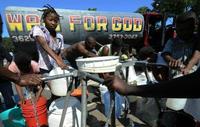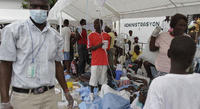-
Cholera threatens to engulf Haiti

The cholera epidemic continues to spread unabated in Haiti; until this weekend the epidemic was co confined to rural Haiti and to the tent camps, erected after the earthquake earlier this year, which house 1.3 million Haitians; on Sunday it was revealed that the first 30 patients in Port-au-Prince, the capital, were admitted to hospitals for treatment; the situation in the country have gotten worse after Hurricane Tomas brought heavy rains last week; NGOs and international relief organizations have been attempting to get clean drinking water to those areas worst- affected by the storm, which triggered flooding and mudslides; the Haitian government appealed to donors for $19 million to cover urgent humanitarian needs
-
-
Haiti cholera death rise, disease spreads
Haitian health officials say there had been a 40 percent jump in the number of new cholera cases; the number of people known to have died from a cholera epidemic in Haiti has increased markedly; health officials say 105 more people have died since Saturday, bringing the total to 442
-
-
Cholera outbreak closing in on Haiti capital; hundreds dead

Nearly 300 Haitians have already succumbed to cholera, and 3,000 were sickened; health organizations fear that the squalid camps in Port-au-Prince where 1.3 million earthquake survivors live offer the disease an enormous potential breeding ground; with the corrupt, indifferent, and ineffective Haitian government not doing much more than paying lip service to the severity of the situation, the task of containing the disease from turning into another national tragedy falls to international bodies, NGOs, and local volunteers
-
-
A superbug could spread to every single person on Earth in one year
If certain conditions obtain, a particularly contagious virus would spread across the planet and infect every single person on Earth in one year; the conditions: it must be a strain of influenza, originate in a major city, and arise during the winter
-
-
Phone call patterns reveal emerging disease outbreaks
People who come down with a fever or full-blown flu tend to move around less and make fewer calls late at night and early in the morning; a trial shows that monitoring the calling patterns of individuals in a trial group correctly identified flu victims in the group 90 percent of the time; epidemiologists say this method may be applied nation-wide to convey telltale signatures of illness to doctors and agencies monitoring new outbreaks
-
-
Anti-dengue mosquitoes to be released in Australia and Vietnam
Some 100 million people in the tropics get dengue fever each year, and 40,000 are killed by it; the virus’s range is expanding, and last week France reported its first locally acquired cases; Australian scientists will release mosquitoes called Wolbachia that infect the disease-carrying Aedes mosquitoes, and makes them less able to carry the dengue virus; the release will take place in Australia and Vietnam
-
-
Sea floor organisms offer response to bioterrorism
Two companies, with $30 million funding from the U.S. Defense Threat Reduction Agency, will search for new antibiotics at the bottom of the ocean that could be used to fight bioterrorism; the companies expect to find treatments for the bubonic plague, Yersinia pestis, and other bacterial infections that could be utilized by terror groups for an attack on the United States
-
-
A new dual vaccine protects against both smallpox and anthrax
A new protective vaccine against both smallpox and anthrax, two agents of bioterrorism, shows promise in animal models; the new vaccine more quickly elicited immunity and was more effective than the licensed anthrax vaccine, BioThrax, in protecting mice and rabbits against anthrax
-
-
Georgia county tests drive-thru shot clinic
Decatur County, Georgia, Health Department’s drive-thru flu shot clinic was held last Friday, and more than 250 people received their vaccination; the important thing, said Sherry Hutchins, Decatur of the County Health Department, is that “The clinic—- gives the health department a chance to test our ability to swiftly, efficiently dispense medicines during a mass-exposure event like a bioterrorism attack, a disaster or an influenza pandemic”
-
-
Virus related to smallpox rising sharply in Africa
Thirty years after the eradication of smallpox, and the end of the mass smallpox vaccination campaign, rates of a related virus known as human monkeypox have increased dramatically in the rural Democratic Republic of Congo, with sporadic outbreaks in other African nations and even the United States
-
-
Aethlon Medical says its Hemopurifier can serve in counter-bioterror applications
Aethlon Medical says its Hemopurifier says the device is the first medical device selectively to target the removal of infectious viruses and immunosuppressive proteins from the entire circulatory system, and as such it is the most advanced and perhaps the only true broad-spectrum countermeasure against viral threats most likely to be weaponized against civilian and military populations
-
-
CDC says U.S. prepared to investigate urgent disease reports
CDC recently released a new report that found that all fifty states have the ability to investigate urgent disease reports, including bioterror attacks, twenty-four hours a day, seven days a week
-
-
U.S. training developing world's docs to detect outbreaks earlier
U.S.-funded program helps health workers in developing countries track disease and speed response to outbreaks; the CDC has established 35 programs since 1980, mostly in developing countries, with funding from several U.S. government agencies and nongovernmental organizations, and has 11 more in the works. Participants investigated 216 outbreaks in 2009
-
-
Researchers develop next generation antibiotics to combat drug-resistant "superbugs"
Each year 90,000 people in the United States die of drug-resistant “superbugs” — bacteria like Staphylococcus aureus (MRSA), a deadly form of staph infection resistant to normal antibiotics; certain bacterial strains include enzymes which help the bacteria to inactivate antibiotics — and a team of researchers are working on turning this powerful mechanism against the bacteria itself
-
-
Docs: drug-resistant superbug is "time bomb" requiring global response
Researchers warn that the spread of a drug-resistant bacterial gene could herald the end of antibiotics; the bleak prediction follows his research into a drug-resistant bacterial gene called NDM-1, or New Delhi metallo-beta-lactamase 1, which was first identified in India; the bug was found attached to E.coli bacteria, but the enzyme can easily jump from one bacterium to another and experts fear it will start attaching itself to more dangerous diseases causing them to become resistant to antibiotics
-
- All
- Regional
- Water
- Biometrics
- Borders/Immig
- Business
- Cybersecurity
- Detection
- Disasters
- Government
- Infrastructure
- International
- Public health
- Public Safety
- Communication interoperabillity
- Emergency services
- Emergency medical services
- Fire
- First response
- IEDs
- Law Enforcement
- Law Enforcement Technology
- Military technology
- Nonlethal weapons
- Nuclear weapons
- Personal protection equipment
- Police
- Notification /alert systems
- Situational awareness
- Weapons systems
- Sci-Tech
- Sector Reports
- Surveillance
- Transportation
Advertising & Marketing: advertise@newswirepubs.com
Editorial: editor@newswirepubs.com
General: info@newswirepubs.com
2010-2011 © News Wire Publications, LLC News Wire Publications, LLC
220 Old Country Road | Suite 200 | Mineola | New York | 11501
Permissions and Policies
Editorial: editor@newswirepubs.com
General: info@newswirepubs.com
2010-2011 © News Wire Publications, LLC News Wire Publications, LLC
220 Old Country Road | Suite 200 | Mineola | New York | 11501
Permissions and Policies
